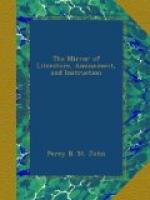His literary tastes bear a certain resemblance to, and have a certain analogy with, his gustatory—proving the truth of that intimate connexion between the stomach and the head, upon which physiologists are so delighted to dwell. In poetry the heresies and escapades of Lord Byron are too much for him, although as a Peer and a gentleman he always speaks well and deferentially of him. Shelley he can make nothing of, and therefore says, which is the strict truth in one sense at least, that he has never read him. He praises Campbell, Crabbe, and Rogers, and shakes his head at Tom Moore; but Pope is his especial favourite; and if anything in verse has his heart, it is the “Rape of the Lock.” Peter Pindar he partly dislikes, but Anstey, the “Bath Guide,” is high in his estimation; and with him “Gray’s Odes” stand far above those of Collins’. Of the “Elegy in a Country Church” he thinks, as he says, “like the rest of the world.” “Shenstone’s Pastorals” he has read. Burns he praises, but in his heart thinks him a “wonderful clown,” and shrugs his shoulders at his extreme popularity. He says as little about Shakespeare as he can, and has by heart some half dozen lines of Milton, which is all he really knows of him. In the drama he inclines to the “unities;” and of the English Theatre “Sheridan’s School for Scandal,” and Otway’s “Venice Preserved,” or Rowe’s “Fair Penitent,” are what he best likes in his heart. John Kemble is his favourite actor—Kean he thinks somewhat vulgar. In prose he thinks Dr. Johnson the greatest man that ever existed, and next to him he places Addison and Burke. His historian is Hume; and for morals and metaphysics he goes to Paley and Dr. Reid, or Dugald Stewart, and is well content. For the satires of Swift he has no relish. They discompose his ideas; and he of all things detests to have his head set a spinning like a tetotum, either by a book or by anything else. Bishop Berkeley once did this for him to such a tune, that he showed a visible uneasiness at the mention of the book ever after. In Tristram Shandy, however, he has a sort of suppressed delight, which he hardly likes to acknowledge, the magnet of attraction being, though he knows it not, in the characters of Uncle Toby, Corporal Trim, and the Widow Wadman. His religious reading is confined to “Blair’s Sermons,” and the “Whole Duty of Man,” in which he always keeps a little slip of double gilt-edged paper as a marker, without reflecting that it is a sort of proof that he has never got through either. His Pocket Bible always lies upon his toilet table. He knows a little of Mathematics in general, a little of Algebra, and a little of Fluxions, which is principally to be discovered from his having Emmerson, Simpson, and Bonnycastle’s works in his library. In classical learning he confesses to having “forgotten” a good deal of Greek; but sports a Latin phrase upon occasion, and is something of a critic in languages. He prefers Virgil to Homer, and Horace to Pindar, and




